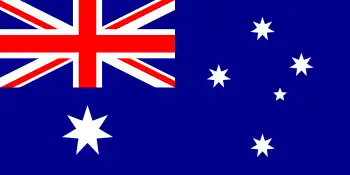Australia at the 1936 Winter Olympics
Australia sent a delegation to compete at the 1936 Winter Olympics from 6 to 16 February 1936 in Garmisch-Partenkirchen, Germany. This was the nation's first appearance at an Winter Olympic Games since the Winter Olympics began in 1924. Australia delegation consisted of one competitor. That was speed skater, Kenneth Kennedy who competed in three events in the Speed skating as he finished in 29th overall in the 500 meters and 33rd overall in the 1500 meters and the 5000 meters.
| Australia at the 1936 Winter Olympics | |
|---|---|
 | |
| IOC code | AUS |
| NOC | Australian Olympic Committee |
| Website | www |
| in Garmisch‑Partenkirchen | |
| Competitors | 1 in 1 sport |
| Medals |
|
| Winter Olympics appearances (overview) | |
| Other related appearances | |
| 1906 Intercalated Games | |
Background
The Australian Olympic Committee was formed on 1 January 1895 with the nation making their debut at the first Olympics in Athens with Teddy Flack being the first representative of the nation.[1][2] This was the nation's first appearance at an Winter Olympics and the ninth overall Olympics that Australia had sent a delegation in.[3] The 1936 Winter Olympics was held at Garmisch-Partenkirchen in Germany and was held from the 6 to 16 February: a total of 646 athletes competed in the 1936 edition from 28 nations.[4] Australia delegation consist of a speed skater, Ken Kennedy who before the games had won the 880 yards and a mile national titles in speed skating over in Britain before competing for Australia at the 1936 games.[5][6]
Speed skating
In what was his only Olympics, 22 year old, Ken Kennedy competed in four speed skating events throughout the 1936 games.[7] His first event was in the men's 500 metres which took place on 11 February. He was a part of the 36 competitors that competed in the distance with Kennedy finishing 29th overall with a time of 47.4 seconds.[8] His next event was the men's 1500 metres which took place the following day. From the 37 skaters that he entered, he finished in 33rd with a time of two minutes and 31 seconds, a full twelve seconds behind the eventual champion in Charles Mathiesen.[9] On 13 February, he competed in his last event of the games (he didn't start in the 10000 metres).[10] From 39 entrants, Kennedy finished in 33rd place overall with a time of nine minutes and 48 seconds. He was almost one and a half minutes behind gold medalist, Ivar Ballangrud from Norway.[11]
| Event | Athlete | Race | |
|---|---|---|---|
| Time | Rank | ||
| Ken Kennedy | Men's 500 m | 47.4 | 29 |
| Men's 1500 m | 2:31.8 | 33 | |
| Men's 5000 m | 9:48.9 | 33 | |
| Men's 10000 m | Did Not Start | ||
References
- (ed.) Peter von le Fort (1936). IV. Olympische Winterspiele 1936 Amtlicher Bericht (PDF) (in German). Berlin: Reichssportverlag. Retrieved 10 June 2008.CS1 maint: extra text: authors list (link)
- "Australians at the Olympics: A definitive history" by Gary Lester ISBN 0-949853-05-4 (suspected errata listed in Errata/0949853054)
- "2002 Australian Winter Olympic Team Guide" PDF file
- "The Compendium: Official Australian Olympic Statistics 1896-2002" Australian Olympic Committee ISBN 0-7022-3425-7 (Inconsistencies in sources mentioned in Wikibooks:Errata/0702234257)
- "Australia". International Olympic Committee. Retrieved 7 September 2020.
- "Australia at the 1896 Summer Olympics". Olympedia. Retrieved 7 September 2020.
- "Australia". Olympedia. Retrieved 7 September 2020.
- "Garmisch-Partenkirchen 1936". International Olympic Committee. Retrieved 7 September 2020.
- "Australia at the 1936 Summer Olympics". Olympedia. Retrieved 7 September 2020.
- "Garmsich 1936". Australian Olympic Committee. Retrieved 7 September 2020.
- "Ken Kennedy". Olympedia. Retrieved 7 September 2020.
- "500 metres, Men". Olympedia. Retrieved 7 September 2020.
- "1500 metres, Men". Olympedia. Retrieved 7 September 2020.
- "10000 metres, Men". Olympedia. Retrieved 7 September 2020.
- "50000 metres, Men". Olympedia. Retrieved 7 September 2020.